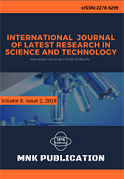DOI:10.29111/ijlrst ISRA Impact Factor:3.35, Peer-reviewed, Open-access Journal
Research Paper Open Access
International Journal of Latest Research in Science and Technology Vol.5 Issue 4, pp 4-12,Year 2016
Correspondence should be addressed to :
Received : 31 August 2016; Accepted : 31 August 2016 ; Published : 31 August 2016

| Download | 125 |
|---|---|
| View | 179 |
| Article No. | 10666 |
This study explores the influence of teachers’ leadership styles, personality traits and IT application on class management effectiveness in junior high schools, through which factors affecting the management effectiveness will be found out and can be effectively executed in later practices so as to enhance class management effectiveness. With junior high school teachers as the research subjects, this study conducted empirical analysis through questionnaire to probe into the relevance between teachers’ leadership styles, personality traits and IT application and class management effectiveness. 100 questionnaires were given out, among which 92 were successfully collected. After ANOVA and t test analysis, the result shows that there are four leadership styles (goal orientation type, stable and conservative type, considerate and supportive type and creative and adapting type) and five personality traits (Emotional Stability, Agreeableness, Conscientiousness, Extraversion and Openness) that are relevant to class management effectiveness. Moreover, the higher degree information technology is applied to the class, the more positive the effect on management effectiveness will be. Therefore, class management effectiveness can be improved in an obvious manner if teachers can appropriately make use of the above four leadership styles, five personalities and IT application
Copyright © 2016 Yi-Chan Chung et al. This is an open access article distributed under the Creative Commons Attribution 4.0 International (CC BY 4.0) license which permits unrestricted use, distribution, and reproduction in any medium, provided the original work is properly cited.
Yi-Chan Chung,Shu-Fang Lin,Chih-Hung Tsai,Chun-Chun Hsiao , " Factors Influence The Effectiveness Of Class Management In Junior High School ", International Journal of Latest Research in Science and Technology . Vol. 5, Issue 4, pp 4-12 , 2016

MNK Publication was founded in 2012 to upholder revolutionary ideas that would advance the research and practice of business and management. Today, we comply with to advance fresh thinking in latest scientific fields where we think we can make a real difference and growth now also including medical and social care, education,management and engineering.

We offers several opportunities for partnership and tie-up with individual, corporate and organizational level. We are working on the open access platform. Editors, authors, readers, librarians and conference organizer can work together. We are giving open opportunities to all. Our team is always willing to work and collaborate to promote open access publication.

Our Journals provide one of the strongest International open access platform for research communities. Our conference proceeding services provide conference organizers a privileged platform for publishing extended conference papers as journal publications. It is deliberated to disseminate scientific research and to establish long term International collaborations and partnerships with academic communities and conference organizers.